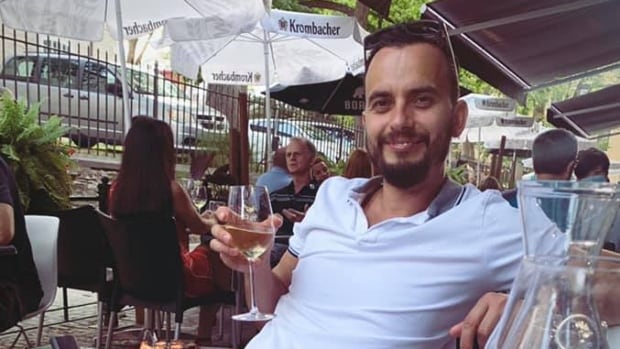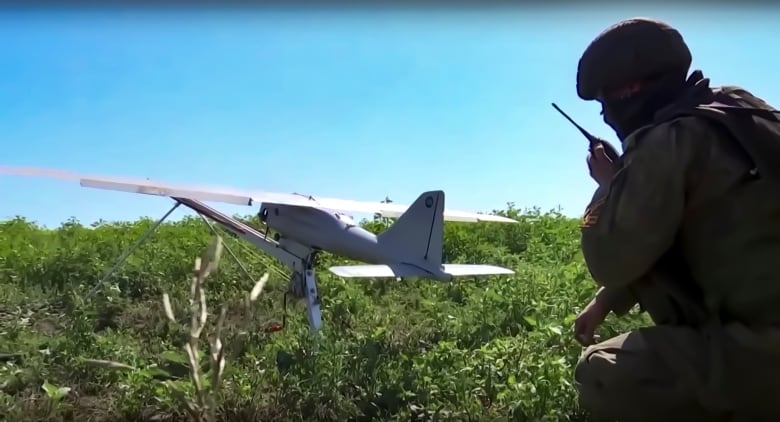
A man from Montreal has admitted to running a scheme to illegally send Russian military suppliers millions of dollars’ worth of electronic parts that have been found in seized weapons on Ukraine’s battlefields.
On Tuesday, Canadian-Russian national Nikolay Goltsev, 38, pleaded guilty in a U.S. federal court along with his co-accused, Salimdzhon Nasriddinov, 53, a Russian-Tajik national living in Brooklyn, N.Y., to conspiract to commit export control violations in the United States.
“It is one of the most significant cases involving items that were destined for the Russian military,” a U.S. Department of Commerce official told CBC News.
“The items, the makes, models and part numbers of the electronic components are the same as those found in significant Russian military equipment.”
This includes Orlan-10 drones, which gather reconnaissance before a strike, as well as battle tanks, helicopters and the Izdeliye 305 air-to-ground missile.
Soon after Russia’s full-scale invasion of Ukraine in February 2022, Western countries including the U.S. and Canada began levying robust sanctions against Russia, limiting and banning the shipment of microelectronics that could be used to build weapons like missiles and drones.
According to court records, Goltsev and Nasriddinov got around those sanctions by using two front companies to purchase more than $7 million worth of electronics in the U.S., including microchips, transistors and circuits. They sent more than 250 shipments first to middle countries, including China, Turkey and the United Arab Emirates, to conceal the ultimate destination they’d be diverted to: Russian military suppliers.

“We would view this as a very serious crime. People are dying in Ukraine at the hands of Russia’s further aggression, and these commodities are helping enable Russia to commit the military aggression it is committing in Ukraine,” said the Department of Commerce official.
The Financial Times reported that the type of Russian missile that destroyed a children’s hospital and killed dozens in Kyiv on Monday contains Western-designed components.
Goltsev’s wife, Kristina Puzyreva, posted photos of traveling with Goltsev on Instagram up until their arrest in a New York hotel room in late 2023. She has since pleaded guilty to conspiracy to money launder related to the export scheme.
Lawyers for Nasriddinov and Puzyreva did not respond to CBC’s requests for comment. Goltsev’s lawyer did not provide comment before publication time.

How the scheme started
At the start of Russia’s full-scale invasion in 2022, Nasriddinov and Goltsev began using SH Brothers Group, a company Nasriddinov had founded the summer before, for the scheme.
According to court records, Nasriddinov is a published author on “integrated systems and other electronic technologies.”
Goltsev worked for a Montreal company called Electronic Network Inc. as an account manager and purchasing co-ordinator. A document submitted to the court to be reviewed ahead of his wife’s sentencing hearing states he had been purchasing electronic components for electronics companies that supply the Russian military for more than 12 years.
The court records say Goltsev maintained an association with the Russian electronics companies Radioavtomatika, Testkomplekt and EKB-Neva — all of which were added to U.S. sanctions lists.
In a text message exchange in June 2022, Goltsev told Nasriddinov he “had many orders” but that it was “becoming difficult to do business here [in Canada through Electronic Network], maybe it will be easier to do through the U.S.”
In February 2023, the United States Department of Commerce put Electronic Network Inc. on its entity list, assigning them strict export controls because of their “significant” contribution to Russia’s military and banning them from exporting U.S. parts. Canada also added the company to its sanctions list.
At the time, a representative of Electronic Networks Inc. was unwilling to speak to CBC News on the record.

Nasriddinov founded a second company a month earlier called SN Electronics that the men used as an additional front to purchase dual-use electronic components from U.S. manufacturers and distributors.
Many of the parts were banned from being exported to Russia or required a special licence from the U.S. Bureau of Industry and Security.
According to court records, Goltsev communicated with U.S. manufacturers and distributors using aliases, and withheld information about where the parts were being sent, to whom and how they would be used.
Nasriddinov received the parts at locations in Brooklyn, and would repackage them and send them to those Russian companies Goltsev had prior relationships with via intermediary countries including Turkey, China and the United Arab Emirates.
“Almost all Russian procurement is going to go through some intermediary,” said the Department of Commerce official. “This is a very complex but typical procurement scheme involving front companies, aliases, false end-user statements.”
WATCH | $80M in war-goods shipments to Russia:
Some of the electronics they shipped were considered the “highest concern” by U.S. authorities because of their critical role in producing Russia’s advanced missile systems, Russia’s inability to produce them domestically and limited global manufacturers.
The men set up bank accounts for Nasriddinov’s two Brooklyn companies to process and transfer thousands of dollars at a time, and they discussed how profitable the scheme was.
Puzyreva also set up two New York bank accounts used to launder cash from the scheme — transactions that correspond with trips Goltsev made to New York to meet with Nasriddinov.
In court documents, Puzyreva claimed that while she benefited financially, she had limited involvement in the plan and requested that be taken into consideration during her sentencing.
According to court documents, the men texted each other about their contributions to Russia’s war effort.
In a Feb. 23, 2023, message exchange, Nasriddinov sent Goltsev a screenshot of bank activity in the SH Brothers bank account and said, “Happy Defender of the Fatherland,” a reference to the Russian holiday that celebrates the armed forces.
Goltsev wrote back, “Happy holiday to you too my friend, we are defending it in the way that we can :).”
The RCMP would not say if it was involved in, or is investigating, the case. It says it works closely with both domestic and foreign partners to share intelligence and enable enforcement of criminal sanctions evasion.
Last year, the U.S. Department of Commerce and Department of Justice created a task force of law enforcement units across the country to get a handle on the rise of illegal procurement of electronics. Canada does not have a similar task force.
Global Affairs says it is aware of the detention of a Canadian citizen in New York, and is providing consular assistance, but would not provide further information due to “privacy considerations.”
Goltsev and Nasriddinov are scheduled to be sentenced in December. They each face a maximum penalty of 20 years in prison. Puzyreva is still awaiting sentencing.